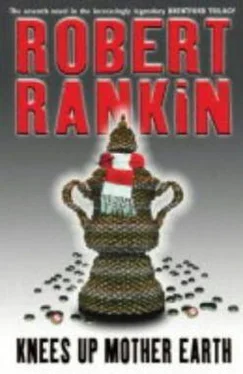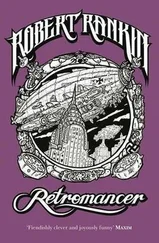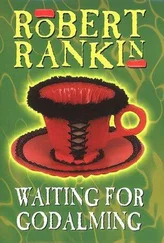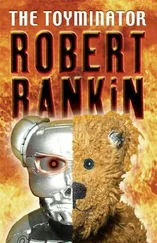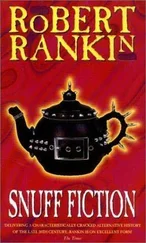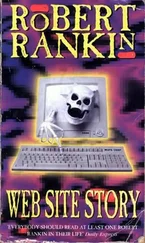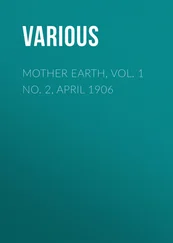Robert Rankin - Knees Up Mother Earth
Здесь есть возможность читать онлайн «Robert Rankin - Knees Up Mother Earth» весь текст электронной книги совершенно бесплатно (целиком полную версию без сокращений). В некоторых случаях можно слушать аудио, скачать через торрент в формате fb2 и присутствует краткое содержание. Год выпуска: 2004, ISBN: 2004, Издательство: Gollancz, Жанр: Юмористическая фантастика, на английском языке. Описание произведения, (предисловие) а так же отзывы посетителей доступны на портале библиотеки ЛибКат.
- Название:Knees Up Mother Earth
- Автор:
- Издательство:Gollancz
- Жанр:
- Год:2004
- ISBN:0 575 07315 2
- Рейтинг книги:3 / 5. Голосов: 1
-
Избранное:Добавить в избранное
- Отзывы:
-
Ваша оценка:
- 60
- 1
- 2
- 3
- 4
- 5
Knees Up Mother Earth: краткое содержание, описание и аннотация
Предлагаем к чтению аннотацию, описание, краткое содержание или предисловие (зависит от того, что написал сам автор книги «Knees Up Mother Earth»). Если вы не нашли необходимую информацию о книге — напишите в комментариях, мы постараемся отыскать её.
Knees Up Mother Earth — читать онлайн бесплатно полную книгу (весь текст) целиком
Ниже представлен текст книги, разбитый по страницам. Система сохранения места последней прочитанной страницы, позволяет с удобством читать онлайн бесплатно книгу «Knees Up Mother Earth», без необходимости каждый раз заново искать на чём Вы остановились. Поставьте закладку, и сможете в любой момент перейти на страницу, на которой закончили чтение.
Интервал:
Закладка:
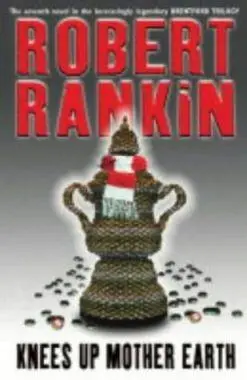
Knees Up Mother Earth
Robert Rankin
For
Jo Fletcher
With love and laughs
1
It was only yesterday and the weather, it seemed, was good.
Mahatma Campbell put his best foot forward.
This foot, the left, was bandaged somewhat about the second toe and encased within an argyle sock, darned at the heel by the mother who loved him. Foot and bandage, sock and what-have-you lurked within a boot of the seven-league persuasion.
On his right foot the Campbell wore a slipper.
The knees of the Campbell were naked, as indeed were his arms. The loins, trunk and chest of him were clothed respectively in a kilt with ample sporran and a vest with room for improvement. The face of the Campbell was redly bearded, the head of him heavily turbaned.
Had he not been so unevenly shod, the Campbell would most certainly have strode, but given the inequilibrium of his footwear, this was an impossibility. And so Mahatma Campbell limped. And as he limped, he sang a song of lochs and byres and bonny banks and braes. And when his memory failed him, he whistled the refrain.
Mahatma Campbell limped the streets of Brentford.
The time was six-fifteen of the early morning clock, the day was a Wednesday, bright and sunny, but with that ever-present fear of precipitation the Campbell had come to live with.
The month was that nippy one known as November.
Mahatma Campbell limped along Moby Dick Terrace, Victorian artisans’ cottages sheltering beneath slate roofs to the left and to the right of him, a post box to his rear, a pub rejoicing in the name The Four Horsemen in the near distance before him. Clipped box hedges confined fussy front gardens, hanging baskets of Babylon hung and a tomcat snored on a windowsill. And the Campbell, in song and in whistle, limped on.
As he reached the Ealing Road the Campbell turned left and limped past Bob the Bookie’s and Peg’s Paper Shop.
Norman Hartnel [1] Not to be confused with the other Norman Hartnel.
, husband of the abundant Peg, numbered the daily papers, a sprightly whistle issuing between his lips. He viewed the Campbell’s passing through the shop’s front window, which was sorely in need of a clean. Norman momentarily ceased his whistling and crossed himself at the Campbell’s passing, for Norman feared the Campbell as surely as the Campbell feared precipitation, but Norman had not yet come to live with his fear. Upon this particular November morning, Norman wore a shirt that was in need of an iron, a shop coat that was in need of throwing away, trousers that were in need of a crease and a pair of black brogues that were never in need of a polish. Because Norman had once been in the Navy, and those who have once been in the Navy always polish their shoes.
When the Campbell’s passing had passed Norman by, Norman took once more to his sprightly whistling, and once more to the numbering of papers – although now incorrectly, and in a less steady hand.
“Norman,” came the voice of Peg, bounding from the kitchenette and striking the shopkeeper in palpable waves that travelled through his wig and rattled the back of his head. “Norman, have you finished yet?”
“No, my dear, not yet.” Norman chewed upon his bottom lip. She hated him, that woman, Norman knew that she did. But Norman didn’t hate her in return. He still loved his Peg, his little Peg, his pretty little Peg. But she was no longer the Peg of old, with whom he’d shared kisses and more down beside the canal. She was no longer little, and nor was she pretty. But her Norman still loved her. In his way.
“Get a move-on, you lazy sod.” Further sound waves struck the shopkeeper and Norman got a move-on.
Norman always enjoyed the numbering-up of the papers. He enjoyed being the first in the borough to read the news of the day. He enjoyed the responsibility of sending Zorro the paperboy forth into the borough, bag upon his shoulder and bicycle saddle beneath his bum, to spread the daily news.
Most of all, Norman enjoyed the numbers of the numbering-up. Norman had a preoccupation with numbers. Numbers were Norman’s current obsession.
“Everything,” Norman had told Neville, the part-time barman of The Flying Swan, during a recent lunchtime session when Norman should have been at the cash-and-carry purchasing bulls’ eyes, mint imperials and party packs of Fisherman’s Friends, “everything is dependent upon numbers. Everything can be explained numerically. Everything can be reduced to a numerical equivalent.”
“Everything?” Neville cast Norman a quizzical glance with his good eye and continued his polishing of an already dazzling pint glass. “Surely not every single thing?”
“You name it,” said the numerate shopkeeper, “and there will be a number to its rear somewhere about.”
“Cheese,” said Neville, as he so often did when stuck for something sensible to say (which wasn’t so often as it might have been, as Neville was noted for the wisdom of his words).
“That’s too easy,” Norman said. “The entire cheese-making process, indeed the very protocols of cheese-making – formulated, if my memory fails me not, by the Elders of Zion way back in the year known as dot – depend upon numbers. It’s all weights and measures and time-spans, not to mention the number of holes.”
Neville chose, upon this occasion, to heed Norman’s words and not mention the number of holes.
“Chickens, then,” said Jim Pooley, who had once owned a chicken, having been tricked into purchasing it by a gypsy who had assured him that it was a goose. And one that laid golden eggs. Sporadically.
“Chickens, eh?” said Norman, who knew the gypsy in question and had briefly considered running away to join the Romanys for a life of romance and rheumatism. “Chickens are a prime example.”
“Steak is a prime example,” said Old Pete, whose half-terrier Chips was rumoured to have once been an accountant named Trevor before he had been transformed into a dog by a gypsy curse. “Prime rump steak. You’ll never get a decent steak out of a chicken.”
“Doesn’t matter what,” said Norman, “feathered fowl or four-legged friend. The numbers are there in the DNA. It’s all been worked out by mathematicians on computers. The entire universe is one big mathematical equation.”
“How big?” Pooley asked.
“Very,” said Norman. “Same again, Neville.”
“So, what is the point?” Pooley now asked.
“It’s a kind of mathematical full stop,” said Norman, informatively. “Its technical term is the decimal point .”
“That’s not what I mean.” Pooley made to sup ale but found his glass empty. “Same again for me, Neville,” he said. “Norman’s in the chair. His number just came up.”
“It didn’t,” said Norman.
“It did,” said Jim. “I’ve been counting. But what I’m asking you is this: what is the point of trying to reduce the universe to a mathematical equation?”
“For the thrill of it,” said Norman, and he meant what he said.
“You can see that he means what he says,” said Old Pete.
“I do,” said Norman.
“Then tell me this,” said Old Pete, “can you reduce to a mathematical equation the beauty of young girl’s eyes filled with the first light of love?”
“Well—” said Norman.
“Or a baby’s smile?” continued Old Pete. “Or the scent of a rose with spring dew upon it? Or—”
“Stop,” said Norman, “you’re giving me a crinkly mouth.” And he dabbed a tear from his eye.
Читать дальшеИнтервал:
Закладка:
Похожие книги на «Knees Up Mother Earth»
Представляем Вашему вниманию похожие книги на «Knees Up Mother Earth» списком для выбора. Мы отобрали схожую по названию и смыслу литературу в надежде предоставить читателям больше вариантов отыскать новые, интересные, ещё непрочитанные произведения.
Обсуждение, отзывы о книге «Knees Up Mother Earth» и просто собственные мнения читателей. Оставьте ваши комментарии, напишите, что Вы думаете о произведении, его смысле или главных героях. Укажите что конкретно понравилось, а что нет, и почему Вы так считаете.
